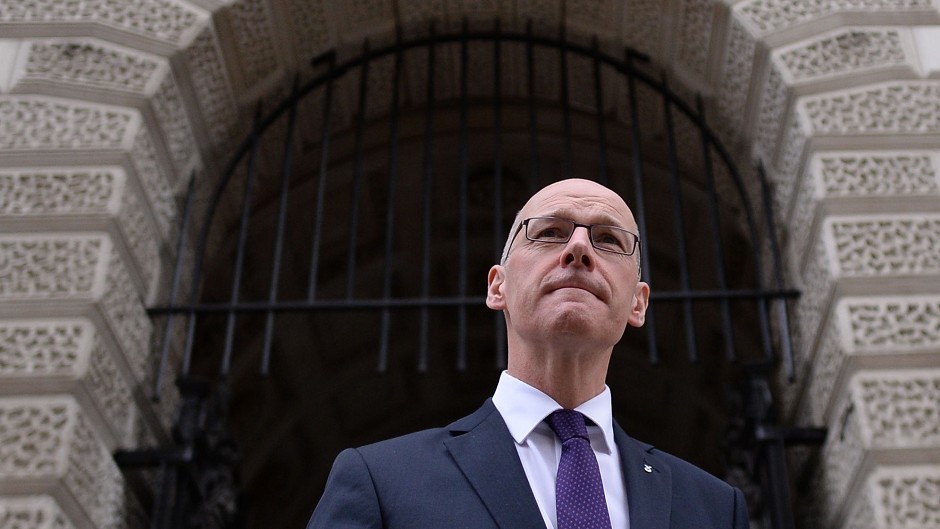The SNP’s flagship policy of full fiscal autonomy was branded “economically illiterate” as it was thrown out by MPs last night.
The battle over the nation’s new devolution settlement dominated Westminster as members began to scrutinise the Scotland Bill.
Attempts by the SNP and some Tory back-benchers to win concessions from the government and move towards handing Holyrood full financial control were rejected after a debate.
Scottish Government ministers began the day by writing to their UK counterparts to demand the transfer of a range of powers including corporation tax, capital gains tax, the minimum wage and National Insurance.
Deputy First Minister John Swinney, who refused the Press and Journal’s request for an interview on full fiscal autonomy yesterday, said it was a “minimum” requirement that the Scotland Bill delivered the “spirit and letter” of the post-referendum Smith Agreement.
The UK Government had said over the weekend that it would not accept amendments to the Bill from the Nationalists calling for a move towards full control of the nation’s finances.
During the debate, Conservative MP Sir Edward Leigh launched a bid to hand full fiscal autonomy to the Scottish Parliament, ending the Barnett Formula and creating a form of effective federalism in the United Kingdom.
The Gainsborough MP warned that Scotland must be handed “home rule” to stop a “toxic mixture” of circumstances exploding the Union, noting Scottish voters had rejected the Smith Commission’s recommendations – developed after last year’s independence referendum and the basis for the Bill – at the general election.
Sir Edward’s amendment was defeated by 298 votes to 68, however.
The SNP’s Westminster leader Angus Robertson also tabled an amendment which would implement the Smith recommendations “in full” and devolve powers over job creation and welfare.
That bid was defeated by 309 votes to 60, SNP deputy leader Stewart Hosie had earlier confirmed his party would back Sir Edward’s amendment – if it was pushed to a vote.
Mr Hosie made the SNP announcement after confirming he would like to see the Scottish Government “draw down” powers for full fiscal autonomy as soon as possible.
He said: “Obviously in order to draw them all down and use them requires transitional arrangements to be in place.
“If we can agree this tonight, if we can agree full fiscal autonomy and the Scottish Government’s ability to draw down the powers at the right time, then we can get the agreement, the fiscal agreement, on the overarching framework and we can all get to work.”
But Shadow Scottish secretary Ian Murray attacked the plans, saying the £7.6 billion “black hole” predicted by the IFS was “over and above” any UK deficit.
He asked: “Will the SNP vote with the Tories to deliver what they want as they have said that they will do? Or will they finally admit in this House that their flagship policy of full fiscal autonomy is economically illiterate?
“It’s quite clear they cannot defend their policy for full fiscal autonomy. We will oppose full fiscal autonomy in all its forms because it’s bad for the Scottish people, bad for the Scottish economy and it’s bad for the future of Scotland.”
Scottish Secretary David Mundell sought to correct the “myth” that Gordon Brown had called for federalism or home rule in the days before the independence referendum.
He also told MPs that there was no empirical evidence the proposals set out in the so-called vow changed the result last September, rejecting the idea the Scottish people had been “somehow defrauded”.
He went on: “The position resulting from the general election is that there was a call by the people of Scotland for the powers which we set out in the Smith Commission recommendations to be devolved.
“These powers will be delivered in the Scotland Bill.”
Mr Mundell said Mr Hosie had “very carefully” avoided any detail in relation to tax when he set out the case for full fiscal autonomy.
But he added: “The SNP will eventually have to tell the people of Scotland how much tax is to rise by to pay for all the measures they propose.”
He said he was not convinced by either case put forward for full fiscal autonomy, neither Sir Edwards’s “red-blooded” version, nor the SNP’s “light“ alternative.
